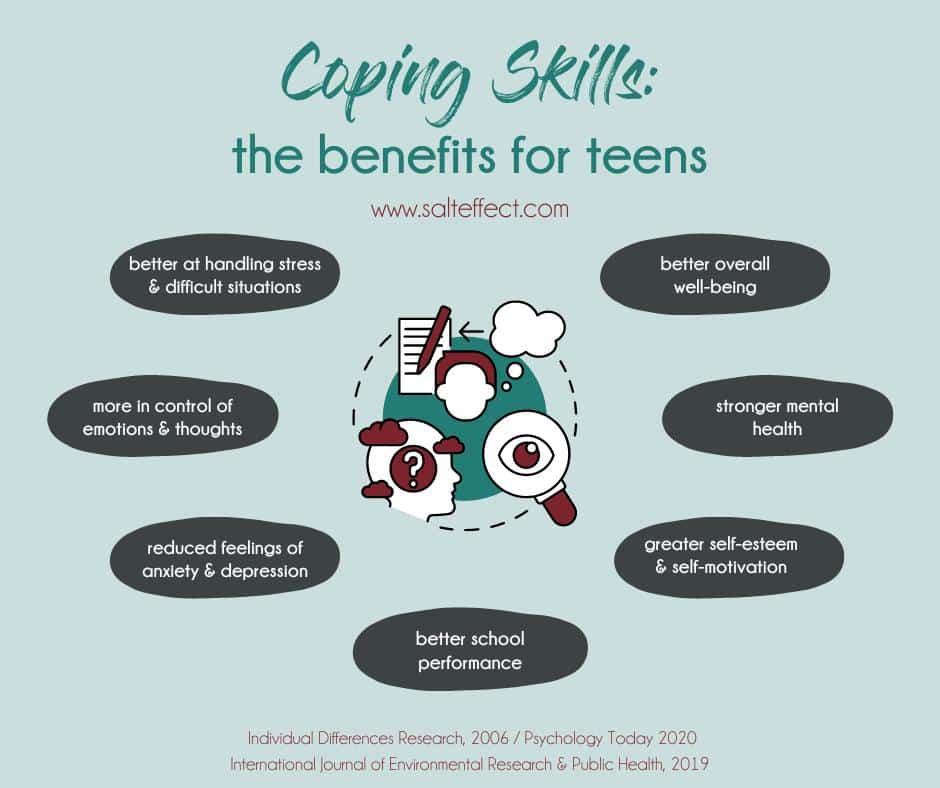Best Coping Skills for Teens: How to Manage Stress and Emotions

In this article, we explore the most effective science-backed coping skills for teens. These strategies can help teenagers deal with stress, manage their emotions and build resilience for the challenges ahead. College professors, high school teachers and moms of teens share what works.
Navigating adolescence has always been hard, but the impact of social media and the pandemic’s disruption of life have made it even more challenging.
School stress and relationship issues are enough on their own. But our kids are also bombarded with information all day, every day. And so much of that information is beyond what they can effectively process.
All of that means it’s more important than ever for teenagers to develop effective coping skills.
Plus, research shows that effective coping skills can build resilience and improve overall well-being.
As college professors and parents of teens, we witness the coping abilities (or lack of coping skills) of hundreds of students every year.
We can easily identify students who are able to adapt and adjust, and we want our own kids to have those skills!
Note: If teens are experiencing serious mental health issues, please seek professional help from a licensed counselor or therapist.
Psychology Today has an excellent search function to help you find therapists, online therapy, psychiatrists, treatment centers and support groups.
On Our Sleeves from Nationwide Children’s Hospital offers great resources specifically for kids and teens.
Defining Coping Skills
Coping skills are the strategies we use to manage stress, anxiety and other difficult emotions. Some examples are deep breathing, exercise and talking to someone you trust.
Causes of Stress for Teenagers
It can be easy for adults (myself included) to gloss over the reality of stress in the lives of our teens. We might forget what being a teenager was like or compare their stress to what we’re dealing with as adults.
Over the years, my college students have done a lot of research about stress for papers and presentations. They’re often dealing with more than I realize.
High school teachers like Tiffany Sellers, an AP Biology teacher and science department chair, are seeing the same things.

“Coping skills are such an urgent need. More and more students are struggling with stress and anxiety. Helping students cope has now become part of my lesson plans.”
— Tiffany Sellers, AP biology teacher & science department chair
This list from the American Academy of Child & Adolescent Psychiatry is helpful for anyone raising, teaching or working with teenagers. Here are some of the things they’re facing:
- School demands and frustrations
- Negative thoughts or feelings about themselves
- Changes in their bodies
- Problems with friends and/or peers at school
- Unsafe living environment/neighborhood
- Separation or divorce of parents
- Chronic illness or severe problems in the family
- Death of a loved one
- Moving or changing schools
- Taking on too many activities or having too high expectations
- Family financial problems
How Coping Skills Help Teens
One of the best things we can do for our teenagers is to send them off to adulthood with the ability to adapt and cope with whatever they face.
There’s plenty of science-backed good news about the short-term and long-term benefits of healthy coping strategies.
Research shows that adolescents with strong coping skills are better at handling stress and difficult situations. Teenagers with the ability to adapt feel more in control of their emotions and thoughts, which can reduce feelings of anxiety and depression.
Coping skills can also help teens do better in school. If they know how to manage stress and anxiety, they can shift their focus to their school work and good grades.
When teens learn and practice healthy coping strategies, they build self-esteem and self-motivation. It also sets them up for good mental health and overall well-being throughout their lives.

Helping Teens Understand Stress and Emotions
A study by Dr. Russell Romero of Columbia University suggests that adolescence may be a perfect storm of increased stress and developing brains. When you add physical changes and heightened emotions, a perfect storm is a pretty good description.
(I see you nodding, fellow parents of teens!)
Helping teens understand their emotions and how to cope with stressful situations isn’t easy. But it’s key to a healthier and happier life, so the effort is always worthwhile.
In general, our suggestions here boil down to one thing: learning to pay attention to yourself and how your body responds to stress and overwhelm.
Name the Feeling
The first step in coping with stress and emotions is to help teens identify what they’re feeling. This sounds pretty easy, but it’s often more complicated than it seems.
Naming the feeling is important because it impacts how you deal with the emotion.
For example, if your teenager is upset, dig a little deeper to understand why. Are they feeling anxious, left out, overwhelmed, disappointed or angry?
Teens may push back on this process. Mine definitely do. But dig deeper, even if they tell you it’s stupid or a waste of time.
My own teens and my college students have had lightbulb moments when I can convince them to slow down and really focus on how they’re feeling.
Taking time to reflect on their emotions will help teens better understand themselves and respond in healthier ways.
Recognize Intensity of Emotions
Emotions vary in intensity, especially during the teen years. Sometimes the intensity makes logical sense to us as parents, and other times it doesn’t.
Keep in mind that our understanding of teen emotions isn’t the point. This is challenging to remember in the moment, especially when the reaction seems out of proportion.
To develop effective coping skills, teens need to recognize how intense their emotions are. Studies show that it’s a biological reality at this stage of life. Only then can they take appropriate action to cope.
Acknowledge Positive & Negative Emotions
Teenagers also need to develop the ability to deal with both positive and negative emotions. Ignoring either one can have detrimental consequences.
Positive emotions can be motivating and negative emotions can be challenging. Both are very real, so it’s important to acknowledge and deal with them in a healthy way.
Healthy & Unhealthy Coping Skills
Teens face a variety of stressors, including school, relationships and family issues. They don’t get to choose the problems they face, but they always get to choose how they respond.
One of my favorite ways to explain this to my college students is with a simple equation:
E + R = O
The Event plus your Response equals the Outcome.
Here’s a 5-minute overview from Brian Knight:
We can respond to situations with either healthy or unhealthy coping mechanisms. It’s important for teens to understand that their response determines both short-term and long-term outcomes.
Healthy Coping Skills
Developing healthy coping skills is a positive way to manage stress and difficult emotions. These new skills can improve your mood and help you feel more in control of your life.
Here are a few examples of healthy coping skills:
- Exercise: Regular physical activity can reduce stress and improve your mood.
- Mindfulness: Practicing mindfulness can help you stay present and focused in the moment, reducing anxiety and stress levels.
- Communication: Talking to friends, family, or a counselor can help you feel supported and less alone.
- Hobbies: Engaging in activities you love can help you relax and reduce stress.
Unhealthy Coping Skills
Unhealthy or poor coping skills may provide temporary relief from stress, but they can have negative consequences in the long run.
Here are some examples of unhealthy coping skills:
- Substance use: Using illegal drugs or alcohol to cope with stress can lead to substance abuse, addiction and other health problems.
- Avoidance: Ignoring or avoiding problems can make them worse and lead to more stress.
- Self-harm: Hurting yourself can cause long term physical and emotional harm.
Equipping our teens with effective coping skills and strategies will help them take control of their emotions and overall well-being.
Remind teens that it’s okay to ask for help if they need it. Seeking support from a network of friends, family, or a counselor can be an important part of coping with stress as a teen.
Physical and Mental Exercises
One of the best ways to deal with stressful times and challenging emotions is to simply move your body. If teens can learn to use physical activity to deal with difficulty now, they’ll set themselves up for a longer and healthier future.
It’s also helpful to master some mental exercises so teens have more options. This will allow them to choose the best thing for them at any particular moment.
Breathing and Muscle Relaxation Techniques
Deep breathing exercises are some of the best ways to calm your mind and reduce stress.
This is one of the strategies I teach my college students in my public speaking class (a top stress-inducing situation for most people).
The body’s nervous system feels the impact of deep abdominal breathing. Allowing more air to flow into your body can literally calm your nerves.
Try taking slow, deep breaths in through your nose and out through your mouth.
You can also try progressive muscle relaxation, which involves tensing and then relaxing each muscle group in your body. This technique helps me sleep when I’m struggling to turn off my brain.
Yoga, Meditation and Prayer
Yoga and meditation are excellent ways to reduce stress and anxiety.
Yoga combines physical postures with breathing exercises and meditation. Teens can get some great tips about using yoga for stress relief from Nemours Children’s Health.
Meditation and prayer are broadly similar and can be very helpful for teens. Both involve focusing your attention on a single point.
When you meditate, that focus is inward on your breath or a personal mantra. When you pray, that focus is on connecting with God or a higher power.
Physical Activities
As I mentioned earlier, physical activity is a great way to reduce stress and improve your mood. Running, biking, swimming, and other forms of exercise can help you release tension and boost your endorphins.
If your teen isn’t crazy about exercise and needs some extra motivation, try team sports or group fitness classes. On Our Sleeves, part of our local Nationwide Children’s Hospital, shares the many mental health benefits of team sports for teenagers.
If you can combine movement with time outdoors, that’s even better. According to the American Heart Association, spending time in nature can help relieve stress and anxiety and boost feelings of happiness.
Remember, coping with stress and anxiety is a process. These exercises are just a few tools teens can use to help manage their feelings.
With practice and patience, they can develop a personalized coping strategy that works.
Creative Outlets
Finding a creative outlet is another powerful tool to cope with stress and overwhelm. Being creative allows teens to express themselves.
But it’s important to emphasize that these creative outlets are just that: an outlet.
Creativity as a coping skill isn’t about performance or perfection. It’s simply about the process and the act of creating.
Here are some creative outlets teens may find helpful:
Writing and Journaling
Writing can help teens process their thoughts and feelings. Sometimes just getting good and bad things out of our brains and down on paper can be incredibly freeing.
And the physical act of writing (as compared to typing or texting) activates more parts of the brain. It can be rhythmic and calming.
Remind teens that they don’t need to share what they write, so there’s no judgment or expectation.
Here are a writing ideas that only require a blank notebook:
- Write about anything that comes to mind. Don’t worry about organizing your thoughts – stream of consciousness writing can be powerful and helpful.
- Keep a list of journal prompts nearby and respond to one of them.
- Write a story or poem or lyrics to a song.
- Write a letter. You don’t need to send it, but sometimes it helps to think about writing or talking to another person.
- Reflect on your day or a specific situation or conversation.
- Make a list of things you’re grateful for.
Imagine giving your teen a journal that's been personalized just for them.
- Text on cover, spine, first page
- 20 vibrant colors
- Lined, blank, dotted or grid paper
Drawing and Painting
Teens can also use drawing or painting as ways to express themselves visually.
Like writing, what teenagers create doesn’t have to be shared. And they don’t need to be an artist to enjoy these activities.
Encourage teens to use whatever materials they have on hand: pencils, markers or paints. They can draw or paint anything they like, from landscapes to abstract designs.
If you want something that’s more of a project, we’ve used and loved the Maker Crate from KiwiCo. So do the moms of tweens and teens in our Facebook gift groups:
Listening to Music
Listening to music can be a very effective coping skill because it can help us relax and unwind. There’s plenty of research about the power of music.
But I also think it’s important to talk about our teens about their music and how it makes them feel. Listening to music as a coping strategy is different from listening for pure enjoyment.
And teens listen to music almost nonstop.
Teenagers are master playlist creators, so encourage them to make one (or a few) to use when they’re feeling stressed or overwhelmed. Maybe they’ll even share it with you!
What if you could listen to music that helps your brain focus or relax? I use Brain.fm every day because it's good music and it works!
I also love knowing that Brain.fm is supported by the National Science Foundation.
Reading
Reading can also be a helpful way for teens to escape from stressors and immerse themselves in a different world.
They can read anything that interests them, whether it’s a novel, comic book or online magazine.
And if you have teenagers who resist reading (like mine), encourage them to try listening to
Remember, there is no right or wrong way to express yourself creatively!
Find what works for you and make time for it regularly. Creative outlets can be a healthy way to cope with stress and improve your mental health.
Social and Emotional Support
One of the most important lessons for teens to learn is that they’re not alone.
The range of emotions and challenges that young people face can be difficult to handle on their own. Having a support system is a crucial part of coping with stress and building resilience.
Here are a few places where teens can find helpful social and emotional support:
Parents and Family
As parents, it’s easy to feel like we’re losing our influence during the teenage years. Research tells us that this is far from the truth.
But we also need to recognize that our roles are shifting. If we want to maintain strong and healthy relationships with our teenagers, we need to show up for them in new ways.
As moms of teens, we know this isn’t easy to do!
But we’ve seen the (often immediate) benefits when we intentionally take a step back. Or, more accurately, when we just shut our mouths and listen.
Maybe we need to hold back a knee-jerk reaction to something our teen shares with us because they’re more likely to listen to our advice if we’re calm. We might need to respond without judgment so our teens are willing to accept our guidance.
Having open and honest communication with our teenagers will encourage them to come to us when they need help. If we can help them feel heard and understood, we’ll be a safe place for them.
Community and Social Support
One of the keys to resilience is connection and contribution. Our teens can learn a lot about good coping skills from interacting with and observing other people.
In addition, communities can offer a variety of resources and support systems.
Teenagers can make connections in a variety of ways:
- Join a club at school to meet other students with similar interests
- Find a youth group and go to their social events
- Volunteer with a community organization (see 117 volunteer ideas here) to give back to a cause you care about
- Seek out support groups for specific issues to connect with others who are going through similar challenges
I spend a lot of time talking to my college students about the importance of asking for help. Many of them see that as a sign of weakness or a vulnerability they’re not comfortable with.
We can help teens reframe asking for help as a healthy coping strategy and a sign of self-awareness.
Long-Term Coping Strategies
It’s important to help teenagers develop long-term coping skills to manage stress and prevent future problems.
The strategies we’ve already discussed are helpful as a response to difficulty: physical and mental exercises, creative outlets and social and emotional support.
Teens also need to learn how to take care of themselves and be intentional about setting themselves up for success.
Here are some suggestions for helping them establish healthy habits.
This book has taken the world by storm with over 10 million copies sold.
Author James Clear begins the book with a shocking and compelling story–my teens and I were riveted to the Audible version that he narrates.
The tagline is “tiny changes, remarkable results” and that’s exactly what this book delivers.
1. Establish a healthy routine
Creating a routine can help teenagers feel more in control of day-to-day life. It’s a foundational coping strategy that can set them up for success in many different ways.
Like adults who work, teens don’t have much control of their school hours and they need to include time for homework.
We can help them with other areas that need to be considered and scheduled:
- Set a consistent sleep schedule and aim for 7-10 hours of sleep each night
- Make time for physical activity, even if it’s just a short walk or stretching
- Schedule time for hobbies or activities they enjoy
- Practice mindfulness or meditation to reduce stress and increase focus
A study from the University of Georgia found that teenagers with healthy routines had better emotional well-being.
2. Set Clear Boundaries and expectations
Most adults have trouble setting clear boundaries and expectations, so how can we expect teenagers to do it? It’s not easy and definitely takes practice, but it’s a valuable lesson.
Teens often feel like they don’t have much control over their lives, so setting boundaries can help. It’s also an important form of self-care, a coping strategy of its own.
I really like this quote from The Cleveland Clinic: “The first step to setting healthy boundaries is knowing what your needs are and what you need to be healthy, have good self-esteem and retain your sense of identity.”
We’ve written a lot about self-esteem for teenagers, so it’s worth checking out these posts:
How can we help teens set healthy boundaries and realistic expectations?
Encourage Self-Reflection Activities
You’ll probably get eye rolls on this one, but keep going. (I’ll tout the benefits of reflection for as long as I live!)
Journaling or mindfulness can help teenagers understand their own values, personal limits and emotional triggers. If they don’t understand what sets them off or wears them down, they can’t set meaningful boundaries.
Be Willing To Talk Openly
Talk about situations that may require boundary-setting and how to recognize signs of stress or overwhelm. Help teens understand their own limits.
Some situations or relationships to consider: friendships, dating, school, phone/screen use, extracurricular activities.
3. Ask For Help
One of the most powerful long-term coping strategies is the willingness to ask for help. We talked about this already, but it’s worth coming back to.
These are only a few of the many ways teenagers benefit when they reach out to parents, good friends, trusted mentors or professional counselors and therapists:
Gain Access To Resources
When a student talks to me about a particular struggle they’re having, I can connect them with helpful and free resources on campus.
But I have to know they need help in the first place.
Teens who share that they’re struggling gain access to resources that others know about: counseling services, support groups, academic tutoring, mentorship programs and more.
Hear Different Perspectives
Teens can learn a lot from other people by hearing insights they might not have considered on their own.
Seeing their situation from a broader perspective can lead to more informed decision-making and better problem-solving.
Learn New Coping Skills
When teens talk to mentors, experts and/or therapists, they learn new coping strategies.
The more ways they know to handle stress and adversity, the more likely they are to find something that works for them.
Build Resilience
Asking for help reinforces the idea that teens don’t have to face challenges alone. There’s strength to be found in leaning on other people when life is hard.
Note: If teens are experiencing serious mental health issues, please seek professional help from a licensed counselor or therapist.
Psychology Today has an excellent search function to help you find therapists, online therapy, psychiatrists, treatment centers and support groups.
On Our Sleeves from Nationwide Children’s Hospital offers great resources specifically for kids and teens.

















Thanks so much for addressing this important topic, and for the tools/resources.
I’m glad it was helpful!